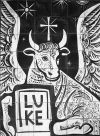
The Gospel of Luke
To Caesar or to God: Lk 20,20-26
In versse 20, Luke proceeds in continuity with the previous verse, it is the scribes and chief priests who are watching Jesus trying to further their case. This time they send spies, pretending to be righteous who could be Pharisees as in the other two Gospels. We have noted that Luke does not mention Pharisees at this stage because they are not appropriate to the Temple setting.
Compared with Mark (Mk 12,13), Luke has highlighted the sense of entrapment in this verse. He makes it clear that they seek to hand over Jesus to the Roman Governor. This echoes Jesus' third prediction of his passion (18,32).
We can see the irony in the next verse with their attempt to flatter Jesus by their praise.
Verse 22 then has "for us" added by Luke. A general question in the other two Gospels becomes specific. That will have the effect of highlighting how the questioners end up trapping themselves instead of Jesus.
Whichever way Jesus answers would be be dangerous for him. If he said it was lawful to pay tax then he would be collaborating with the Roman occupiers. If he said it was not, then he would be acting against them. The purpose of the questioning as we saw in verse 20 is to obtain a reason to hand over Jesus to the Romans.
A Roman Coin was inscibed with the claim by the Roman Caesar to be Divine Augustus. The image on the coin itself was idolatrous. (The Greek word is "icon" and we can think of the signifcance of icons today.) The very fact that the Jewish priests were able to produce and handle such a coin implicates them already. Jesus just looks at the coin, he does not handle the coin himself (that's the tricky question, because handling the coin would have contaminated Jesus as well).
With his answer, Jesus has both avoided the trap and also trapped his questioners. Allegiance to God and to Caesar are quite different and must not be confused. It may be necessary to use Caesar's coins, but not to accept the claims they made.
Thus Jesus has turned the tables on the Jewish priests. He has entrapped them, not himself. Once again they have lost authority ("lost face") before the people. Jesus instead has maintained his authority.
A final note is not to read too much into this incident. It is specifically about the conflicts between Jesus and the Jewish leaders. This not be widened into matters concerning separation of Church and state.
We can now return to the main page.
